[My publisher] was like, "We always publish our essay collections in this size and people like it, because they can throw it in their bag." And as much as that frustrated me, they were right and they are right. And there are all those types of signifiers that let you know whether a book will be literary or practical or nonfiction or fiction. And those things as consumers, we code them and register them.
Jen Winston (she/they) is a writer and bisexual whose work focuses on dating, queerness, and the millennial condition. They are the author of the critically-acclaimed book, GREEDY: NOTES FROM A BISEXUAL WHO WANTS TOO MUCH, which was just named a finalist for the 2022 Lammy Awards from Lambda Literary. Paper Mag wrote that GREEDY is “at once relatable, laugh-out-loud funny, and refreshingly illuminating,” and BuzzFeed named it a Best LGBTQ+ book of 2021, calling it “more insightful about identity than any book this year.”
Jen currently lives in Brooklyn with their partner, dogs, and iPhone. You can follow Jen on Twitter, Instagram, and TikTok at @jenerous.
In this conversation Jen and I discuss book marketing, including:
-Working with a cover designer
-Hiring a publicist
-Designing a custom Instagram filter
-Creating influencer packages
-The differences Twitter, Instagram, and TikTok for marketing books
-Reaching out to your niche audience
TRANSCRIPT
Ben Guest:
Jen, thank you so much for coming on.
Jen Winston:
Yay. Thank you for having me. I'm excited to be here.
Ben Guest:
So the big overview question, what are the fundamentals of good marketing for a book?
Jen Winston:
Ooh, I'm glad you asked that. Well, I'm going to tell you what my day job is, because this is a very unique time when I'm not going to get in trouble for it, because I have given my two weeks and I'm between jobs. So currently I work at Meta during the day as a creative director, an associate creative director, focusing on things related to the meta. I just gave my two weeks, and in May, I will be joining Lyft as their creative director of social media. So I've been focused in the creative and marketing world for quite some time.
Jen Winston:
I'm normally not allowed to talk about that when I'm also like technically "Promoting my book," but what are they going to do? Fire me? They can't, because I'm leaving. So it's a very exciting time to be able to say that on a podcast, but I think what makes good book marketing and what makes good marketing in general is marketing that takes on the position of the person who's seeing the marketing and asks, what could this mean to people. And with book marketing, you want to make that you don't assume people already know everything about your book or anything about your book for that matter.
Jen Winston:
I think it's really important to have the premise of your book distill down into a very succinct sense or two, and marketing can also shape the core idea of your book. And in my case, that's really what happened. I thought about bisexuality. I had recently come out and I was still ashamed of it. I felt like it was this binary identity that I didn't really support. Like I was starting to learn more about gender and I was like, "There are lots of genders." This feels like an identity that supports men and women, and I don't really like that, but I've always identified with this word. And then I started reading about bi-theory, bisexual, and I learned that bisexuality actually challenges all these types of binaries, including gender. It just requires a bit of a reframing of the way we think about it.
Jen Winston:
And so I wanted to make sure that I was like, "That's what I want to write a book about now that I really believe in bisexuality," because it's been something that's been true for me for so long that I've been ashamed of essentially. And I was able to suss that out with the target audience and be like, "If I'm a bisexual who has never seen a piece of content like this, there are probably other bisexuals who have never seen a piece of content like this." And I looked on TikTok and there were 10 million uses of the hashtag bisexual. And so I was like, "Okay, that's an audience that I should speak to." Like, those people need to be seen and they need art created for them. And that's why I wanted to make sure I put the word bisexual in the title.
Jen Winston:
And I talked a lot throughout the process about how are we going to reach that audience. And it was always confusing because we were like, "Do we want to put it in this books for in section?" Which is like a lot of times books for straight white women typically. And then we could also put in the LGBTQ section where people might not see it. And I was really torn on that because I really think it speaks to a lot of the challenges the bisexual community faces. It's like, "Are we gay? Or are we straight?" And the reality is that like we are bisexual. We are none of the above at all of the above at the same time. And so it was really challenging to create something that spoke to that audience and found them where they were.
Jen Winston:
One thing that I also learned throughout the process is that the cover has so much to do with how the book finds its audience, because whether we realize it or not, books are brands. It signals to us based on design and in the literary world, there are certain books that we can see are going to be like, whether it will be a self help book, we can see whether something will likely be a memoir. That's why my publisher wanted my book to be a paperback book because if it were a hard cover, it would be less clear that it was a memoir. They're-
Ben Guest:
It's interesting.
Jen Winston:
Yeah. They were like, "We always publish our essay collections in this size and people like it, because they can throw it in their bag." And as much as that frustrated me, they were right and they are right.
Jen Winston:
And there are all those types of signifiers that let you know whether a book will be literary or practical or nonfiction or fiction. And those things as consumers, we code them and register them. And I knew that my publisher wasn't going to market my book as a literary book. And I know that it's a long pretentious cycle to get marketed as a literary book. You have to have an MFA and you have to have a... No offense to people getting their MFAs, Ben. And you have to have... Yeah, you have to have a lot of degrees and you have to have published in the New Yorker and the New York Times and you got to have all the bylines and I didn't have any of that because I've had to work a full time job and I could never afford to pay for an MFA program.
Jen Winston:
And I still wanted people to recognize that my book was quality writing and that it contained valuable information. And also that it experimented with form a little bit, because a lot of the essays in my book do experiment with form. Like one is written as a doctor's diagnosis or like a clinical study, another's written as a screenplay. Another is an email exchange. And then the whole thing is a blend of social theory and memoir. And I was really striving for that and I wanted to give it this high brow approach. And so my publisher had designed some covers that, when they sent me the covers, it firmly positioned it in the realm of chicklet. And I was like, "Oh, this answers the question of where we're going to position the book." Oops, sorry, hit the mic. "This answers the question of where they want to position the book. They want to position it toward straight women at target. That's what they want." And yeah, there was one cover with cherries wearing panties or something. It was like-
Ben Guest:
I still remember that from our first conversation.
Jen Winston:
Oh yeah.
Ben Guest:
It's so fucking stupid.
Jen Winston:
Well, I will hand it to the designer because it's a really challenging design brief to all the earlier things I was saying. I didn't want a bisexual flag, but there's also not a lot you can do [inaudible 00:06:59] signal to this community. And so it was huge challenge. And I knew I needed to bring in like big guns essentially to solve that challenge and also to help position the book is a bit more literary. And so I found a designer who I love, whose work I loved on Instagram, his name's Rodrigo Corral. He just put together like a montage of all the covers he's designed. And I was like, "Oh my God," he designs like so many Chuck [Palahniuk 00:07:25] covers, just so many bestsellers, This Is How You Lose Her. So many iconic covers have come from his mind.
Jen Winston:
And I DM him totally unsure of what would happen. And he said he would, I had to pay him, but that was the best money that I spent because it helped my book. It helped people be proud to hold my book up on Instagram and for a physical copy of a book that is so, so important. And it's honestly important for an ebook too. I think, where I doing it over again, I would want to think more about how the cover plays in an e-book environment, especially for readers that don't have that view in black and white. That's how important the cover is. You want to think of it at every single phase. I also didn't like love how my cover collapsed to an audio book style. It was so built for the paper that it just didn't really play as well everywhere else.
Jen Winston:
And even when we tried to put a quote on the cover, we couldn't figure it out. So we ended up putting it on the back. But I think, yeah, the cover was such a huge part of the marketing. And then I let it inform this overarching approach and campaign and fun that we were going to have with the style. And so I worked with a friend, even though I'm a creative director, by trade. I hired a friend of mine, who's a designer to be my creative director and also emotional support during the launch. And she created social media templates for me so that I could just write down if I got press. I could put it into a social media graphic and share it. It made it much easier for me to go from zero to a hundred. She also designed my website, which is greedy-bisexual.com, which anyone can go to and buy the book if you want.
Jen Winston:
And like Angelfire website, it feels like it's from the late nineties.
Ben Guest:
Yep.
Jen Winston:
And I'm really proud of the website. She, my friend did such an amazing job and there's so much nostalgia for that time period in the book that it just feels very cohesive and yeah. So that was really important. And-
Ben Guest:
So there are-
Jen Winston:
Yeah go ahead-
Ben Guest:
There are a couple of things-
Jen Winston:
[crosstalk 00:09:43] time.
Ben Guest:
No, it's all great. There are a couple things I want to headline for the audience. So first is, one of the first steps you took was figuring out is there an audience for this content? And like you said, there was something like 10 million posts with the hashtag bisexuals, so okay, there is an audience that wants this content. Then second, you made such a great point about what is the physical touch and feel and look of the book, communicate subconsciously to someone walking in the store and seeing it or someone just seeing it on the digital bookshelf of Amazon or Apple books. And I think you use the word code, like we subconsciously code "Okay. Oh, that book falls in this category, that book falls in this category." So having your fit that type of category, memoir in this case, is important. Even though it's something as a reader or an audience, we might not even be aware that we're doing.
Ben Guest:
And then three the cover. And that's one of the first conversations we had as well. Your cover is kick ass. I'll post a photo of it in the show notes. And I always tell people the three things you want to spend money on, whether you're self-publishing, traditional publishing, whatever it is, good editor, good copy edit, and a great cover. Those things are worth their weight in gold.
Jen Winston:
And you know what else I have come around? I don't know if I felt this way at the time, but I also invested in a publicist. And that was the biggest line item I've ever paid for anything. I don't own a house, that was like a down payment on a house. It was 25 grand, 25,000 on my publicist, which I used my advanced for. And I had a $55,000 advance, which I recognize feels like a lot. Now that I was literally doing my taxes before this, it feels like I wish it had been far less than that. Obviously I could write off the publicist and stuff and the coverage designer, but I basically put all that money back into marketing and promoting the book and I'm glad I had that money to do it with, I don't know how people write books for a living. Like it's impossible.
Jen Winston:
And I really think that is important to acknowledge, is the ridiculous privilege that it takes to be able to do this. Even in terms of privilege of time. Like I had the time to work a full-time job that allowed me breaks on nights and weekends where I was able to write this book. But still was like running over into my personal life so significantly and that's a privilege. And I was able to spend my whole advance because I work a full-time job, but there are many people, obviously who don't. And then when you self-publish, you have to use your own money for this. So being very conscious of that. But I think probably when we talked last July, I was not super hype about the idea of my publicist, because I was like, "I don't know what she's doing, et cetera, et cetera."
Jen Winston:
But I am so happy that I worked with her in the end. My book got a ton of great press and I definitely credit her with that. I think when you're self-publishing, it's easier to realize that if you don't pay for something, it won't happen. Or if you don't pay for something or do it yourself, it won't happen. I thought that my publisher would take care of a lot of the publicity. And I've learned from talking to friends that it's very rare that a publisher will go to bat for you as if the book is their own child. Because when you write a book, it's like the most important thing to you. No one cares about it as much as you, period.
Jen Winston:
And in many ways, I feel like even though I was working with a publisher and I had some financial and infrastructure support from them, obviously I had distribution support from them, which was something I could never have handled by myself, I was totally unprepared for that. I do think I tackled this in a way that was similar to self-publishing challenge, because I was like, "I want the launch to look like this." And part of that was that I felt beholden to my marketing colleagues and I wanted to show off that I could market well for myself. I also did like a custom Instagram filter and that was also a great use of money. But you have to be very-
Ben Guest:
Talk about the custom Instagram filter.
Jen Winston:
Yeah. So those Instagram based filters that you can do, the ones that will circle over your head with "What kind of fast food are you?" So I did one that was called, "What bisexual are you?" Or "What kind of bisexual are you?" And I worked with this amazing creator, amazing non-binary creator named... It was important to me to work with Queer creators as much as possible. And I'm really glad I was able to do that for the most part. And the creator made this filter so visually, it tied really well to my book cover.
Jen Winston:
It had the same font and the same colors. And then the little logo at the bottom was the book cover itself. And so it says "Greedy" in the lens title. But the actual filter says, "What bisexual are you?" And that was honestly some of my mobile marketing savvy that I was able to bring in. Because I was like, "If this just says the name of my book, no one's going to want to use it. But if it says, 'What bisexual are you?' People are going to want to use it. And then they'll also this subliminal marketing about my book." And that was like 600 bucks.
Ben Guest:
That, just before you even said the price point, that just seems like such a genius idea because people are plugging into actively doing something. And then of course it's also marketing your book. I'm actually co-writing right now a memoir of a retired NBA player and he played on a couple different teams. And so I'm already envisioning we could do like, "Which team are you?" and then you could pick, and then it's the same thing, but at $600, that's-
Jen Winston:
Well that person should raise their rates, because they're amazing. Their work is so amazing. I highly recommend following them. And-
Ben Guest:
What's their name again?
Jen Winston:
Their handle is Non Finery. Yeah. And they have great filter on their profile as well. I think with that idea of the, "Which team are..." You'd want to make sure that there's some clear callback to the facts that it is a book, that's the challenge with a filter. Because you have to make people want to do it, but then you also have to make people know that it's a book. So in my case, my cover is a bit hard to read. The letters are kind of all over the place, which is what I love about it, because bisexual confusion. It plays off of that. But I was relying on the fact that people would hopefully see it again or have seen it already on Instagram, because so much of my marketing was on Instagram. So I didn't expect anyone to convert to buy my book, write off of that. It was just like another thing in the ecosystem.
Jen Winston:
And then the other thing I did that was probably... I don't know if it was helpful. It was so much work. So it's really hard for me to say if the work paid off, but I sent influencer packages to almost 200 people. And in each of those packages, there was a book, a card that I hand wrote to each of them, a custom message. I hand wrote it about something we shared via... And most of these people I hadn't met, it was just people I knew through... There was a penis lollipop that I got from a gourmet place called Cocksicles and my publisher did pay for those somehow. And then there was a vibrator in most of them that was donated by a vibrator company that I worked with in the past. And they donated a bunch and later I realized it was actually a great deal for them because they basically sent me $2,000 worth of inventory and got like so many more impressions based on it.
Jen Winston:
And I did all the work. So I was like, "Okay, I guess that makes sense." I basically ran a full influencer marketing campaign for them for free. And then the packages also had... And this was the worst part, but also the most impactful. I handmade beaded bracelets. I handmade 200 beaded bracelets that said "Greedy" or said "Bisexual" or said "Greedy bisexual," some people got too. I literally sat and watched TV for three months and hand made 200 bracelets. It was absolutely ridiculous, but it was also the thing that most shared because it was like the thing most people posted about, because it was what made them realize that I actually had made this bespoke for them. And honestly I think some of them might have even thought that I bought them because by the end I got like really good at making them.
Jen Winston:
So the earlier ones, they knew that I'd made them by hand, but it was so much work and I would say about 70% of the people I sent them to, probably shared it. And I'm not sure that really converted to people reading it, because I think on Instagram, people think that it's just an influencer book and it's being marketed by influencers. It's probably full of influencer... Like that big content. So I would do that a bit differently in the future, but I also gave-
Ben Guest:
What would you do differently?
Jen Winston:
Just not exhaust myself throughout the whole process. That's the number one thing I would do differently. Is like prioritize my mental health. I was on a deadline because of my publisher and because it was coming out. And I wrote and published the book in under a year. So I wrote the book and then I dove into this marketing campaign and it was without a doubt, the hardest year of my life. I'm still recovering, my body is still recovering. I'm burnt out to a point that's going to take years to recover. And hopefully I get a little bit of time off between jobs and I'm hoping that helps. But it just was incredibly exhausting. But it was-
Ben Guest:
So that's a brutal schedule for a traditionally published.
Jen Winston:
Yeah. I don't know why.
Ben Guest:
Let's go back to the publicist. What were some pieces of advice that your publicist gave you?
Jen Winston:
So I don't know that my publicist actually gave me that much advice because I knew a lot because I've also worked in PR. So I was like, "This person works for me. I'm paying them this much money, they will do what I say." So I sent them a list of places I want it to be, I sent them a list of every journalist.
Ben Guest:
And, do you mean like reviews or interviews or something else? What do you mean?
Jen Winston:
I sent a [crosstalk 00:20:42]. Yeah, I wanted it to be in the New York Times. I wanted it to be... I put Vogue, I put Buzzfeed, I put Cosmo. I didn't put Rolling Stone, but I probably should have.
Ben Guest:
Let's call back.
Jen Winston:
I should have. And I also tried to think through things like that. Like what are places I mentioned in the book that might be interested and yeah.
Ben Guest:
Okay. Wait, so let me ask a question about that. So let's say you have your top 20 places you want the book to appear and you hire a publicist. What was the hit rate? What percent of those top 20 did the book end up appearing?
Jen Winston:
That's a good question. And if I were tracking that I'd probably be better situated for that. I had two goals for the book. Well I had three. One was to be on the New York Times bestseller list, which did not happen. And that was a very hard goal. And I had no idea if that was going to be possible and it's like not possible. The second one was to get the cover recognized by the New York Times which happened. It was named one of the best covers of 2021, which was an amazing thing. I don't think most of my fellow authors would care as much about that accolade because they normally left it up to the designer, but I was really involved in that creative process. And so that was meaningful to me.
Jen Winston:
And I actually was able to share the briefing process and all the explorations we did. Once that news was announced, I shared all that stuff on my Instagram and people were like, "This is so cool to see inside this process." And I think everyone was shocked that I was so involved. So that was really a fun thing. And then the third one was to get it nominated for a Lambda Literary Award, which it was. And I don't have... Yeah, as an author, you don't have that much control over that, but you do have control over whether it's submitted. Yeah. I would say that was the biggest asset of the publicist.
Jen Winston:
So I thought my friend... Aaron Williams, who wrote the book commute, which is an incredible graphic novel, like amazing, highly recommend it. I had asked if Erin had used a publicist and she said, "No," but she wished she had because then maybe it would've been nominated for more awards. And I was like, "Oh, crap. I should get a publicist." I talked to several authors who had not had publicist and they were like, "I should have gotten one" and I didn't want to have any regrets. And so I was like, "Whatever, take my money."
Ben Guest:
How did you choose your publicist?
Jen Winston:
I spoke to three on the phone and this was the first... Beth Parker is who I worked with and she was awesome. And she was the first one who asked me to read my manuscript and I was like, "Cool. She cares about..." And she did that before she accepted. I think I was like, "Oh, that means people are going to know what kind of thing is coming from you." And that meant a lot to me, to be able to work with somebody who understood what they were selling. And I think that if somebody's like, "Yeah, I'll do it." Like, "Yeah, we could do that." If they're going to take time to look at your manuscript and understand... Honestly, even if she didn't read it was a smart move and she waited a week. I was like, "If she just didn't read it..." But I can't imagine if she had asked to read it and then was like, "You know what? Actually, I don't want to work together."
Jen Winston:
That would've been awful. But I was anxious. I was like, "I hope she likes it." And that is kind of where you want to be. I think I wanted someone who recommendations when editors at magazines saw her name in their email inbox, I wanted them to be like, "This person has credibility" and I didn't even realize this, but it turns out she has become marketer for all these Queer books. She's doing so many Queer books. And also, that's another reason I gravitated to her. She had an example in her portfolio of a book a Tomboyland, by Melissa Faliveno, that book I had seen everywhere. And even though I mention it to people, I don't know if you've seen it. Probably not, but you're not the target. And so I was like, "Oh, this book reached its audience, because I'm the target for that book." And so I was really impressed by that book's marketing and PR and I had that thought and I was like, "You're the perfect person."
Ben Guest:
So the three big benefits of having a publicist, which of course traditional published authors and self-publish authors can engage is the credibility of, "Okay, if she's emailing Vogue, they're going to open the email," the saving time aspect of doing all this work. And then also some halo effect of submitting for literary award awards. Is that correct?
Jen Winston:
Well, so I thought that would come through her. It ended up coming through my [inaudible 00:25:39].
Ben Guest:
Oh interesting.
Jen Winston:
But I do think the press didn't hurt in terms of getting that to happen, getting the award to happen. I think it helps reinforce it for reviewers. Yeah, in my case it was really saving time, but I think there's this sense that it's not happening if no one's working on it. And I even felt like it was not happening, like press wasn't happening when there was someone who I was paying a lot of money to work on it. And just honestly, a good chunk of it was peace of mind and it was worth it to me, because this book was so, so important to me. And I had the means to be able to do it, which is like such a huge privilege, but...
Ben Guest:
Okay. So you mention Instagram earlier. So let's talk Twitter, Instagram, TikTok. What are your thoughts on each of those for book marketing and lessons learned, advice for the audience, et cetera.
Jen Winston:
Journalists live on Twitter. That is a lesson that I've learned over the past few years for better or for worse. Journalists live on Twitter. So if you want a journalist to see your content, or if you think there's something newsworthy, it's a great place to connect with them, is through Twitter. It's also a great place to double down on hot takes from your book. You see a lot of people writing threads on Twitter, responding to current events. You can basically write a think piece on Twitter that you've already written in your book, and just keep repeating the information so that people notice you and recognize you as someone who is telling that story and doing that work. That's something that I always tell people to do on social media, but I have a really hard time with. Is if you've said something, you don't have to only say it once. You can say it over and over again, and get your money's worth out of that thought that you had, because you're a writer and that's our intellectual a property.
Jen Winston:
And to be able to like bring... I could write a much better op-ed about bisexuality now that I've written a book on it, for example. And so I am hoping to do that this year for bi-visibility day to drive attention to my book again. And I can also respond if something biphobic happens in the media, I can take a stance and explain the nuances of it on Twitter or I can make memes about being bisexual all year round and people will follow the content. I would say, the most important thing about TikTok is for books, is book talk. And I do think there's something very physical about book talk. Actually I want to take that back. You can keep it, you can keep it in, but I want to take that back.
Jen Winston:
Because the most important thing on TikTok is book talk. Is actually like only part of the story, because every book is also about something, it's not just like about books. And so you can also speak to the people who are already talking about whatever subject you are writing about. So I think a big thing is making sure that content finds its audience and that you are engaging with the people who are influencing the communities that your content speaks to. So if it's an ebook, for example, about basketball, I'm sure there are people... I'm very far away from this realm of TikTok personally, but I'm sure there's like retired NBA player niche of TikTok.
Jen Winston:
That's the best thing about TikTok. So you can find the exact right person and engage with their content, see what kind of content they post and try to figure out how your point of view could fit in or see if they ever do book recommendations or if they ever share thoughts from people and credit the books that they get their information from. An interesting example is while I was looking for this around bisexuality, for one, I found a bisexual book talker who lived in London, so we sent her my book.
Jen Winston:
And then I also found this very small TikTok called the Bi Pan Library. And it's just all about books that are bisexual and pansexual. And I was like, "Yeah, I'd love to send you my book." And I asked them and they were like, "Yeah, we'd love to receive it. Great." And now we're like loosely internet friends. But it barely had like a thousand followers, but it was like absolutely worth my time to get it in front of a thousand people or even like those 10 who are actively following the page. It's just very important to engage with those communities that are already interested in what you're talking about.
Ben Guest:
Yeah. So I have a question about that in terms of like, what did that outreach look like? But before we do that, so you mentioned Twitter, TikTok. What about Instagram?
Jen Winston:
Oh, Instagram is the one I thought I had already talked about it a lot. I guess on Instagram, it's a lot about seeing and being seen. Surprisingly the thing that I found that performed best for sales on Instagram was sharing a photo of my book, a chapter. And I have a chapter called True Life: I Masturbate Wrong. I shared a photo of that chapter, which has like a pretty shareable title. And my that's like the highest my sales have ever been, was the day I shared that. Because that post was being shared and I also included DMs I had gotten from people who were like, "We masturbate the same way. Thank God." And like "Your book's so relatable, especially this chapter." It was like a funny post, but it really made its rounds.
Jen Winston:
Actually, I think also people were like, "Oh, this is what the content of this book looks like." They'd only seen the cover and then just see like that's what it looks like inside. I've been meaning to share the table of contents, because I think people are like, "Oh that looks cool. Share the best quote in your book, share the best paragraph, highlight it. Put it on a quote card." But also don't be afraid of sharing it in its context. Like with other words around it and the actual thing you want people to read underlined or something. Because people love to know what they're buying, and if you can show them something like a piece that they like, they will potentially want the whole thing.
Ben Guest:
That's such a great quote. "People love to know what they're buying."
Jen Winston:
Yeah. It's very self explanatory, but also you wouldn't expect it. People often think that you have to tease, but... There's a quote from David Ogilvy, who's founded an ad agency. I love this quote. He says "Advertising can sell a bad product once." And the idea is that if people find out the product is bad, they're not buying it again. And the same goes for art or books, because if it's not good, people aren't going to recommend it. And recommendation engines, they say, "Humans talking to one another, serving is recommendation engines for your book." Is like the most powerful force that your book could-
Ben Guest:
Yeah. Positive word of mouth. Okay. Two quick questions. One, when you said you shared the book chapter on Instagram, does that mean you shared a photo of the first page of the chapter or you shared like the whole-
Jen Winston:
Yeah, I shared the first page and it has the title and the title is obviously what it is. It was a carousel, an Instagram carousel post with that as the first photo and then a few DMs. And then the chapter compares my masturbation style to an undulating monk seal. And so it references a YouTube video. And so I included the snippet of the YouTube video and people really liked that.
Ben Guest:
You mentioned reaching out to the TikTok person, Bi Pan TikTok, I think. It's such a great advice that you have to find that niche audience that is like 100% your audience and that's who you want to reach out to. Because that's who's going to generate positive word of mouth. So what did that reach out look like from you to that TikTok person?
Jen Winston:
Yeah. It started a few months before and I did that with so many people. I would did this exact thing with so many people who I was like, "They should read my book" or "I want them to read my book." I followed them and then I started engaging with their content a lot. And then I started commenting on their posts and stuff and making my comments as witty as I could. Or if not, if I couldn't make them witty, I was at least like, "Love this." And I would share their stuff. On Instagram sharing is especially important because it opens your DMs with someone potentially or it puts it to a direct message. So that's an especially important way to start a connection. And it also just shows that you support someone's work.
Jen Winston:
Yeah. In the few months prior when I was doing reach outs to influencers, I reached out to them and I said, "Hi, I love your content so much and love all your recommendations. Would it be okay if I sent you a copy of my book? If so..." I have the message like almost memorized. I typed it like 300 times, "if so, please let me know the best address. It'll likely ship around this time." I tried to give them as much information as I could and with people who I didn't know as well, which I forget if I did this with the BI Pan Library, I said a few things that it was about. I was like, "It's about bisexuality and contains lots of weird sex stories" or I would give them a bit of context.
Jen Winston:
And then with people who were more design minded, I sent a photo of the cover. I was like, "Would love if I could send you a copy of my book." And I sent the book so they could see like, "Oh, this looks cool." And I really tailored each of those approaches. And I think just a lot of it is just about putting yourself in the other person's shoes, whether that's all the people you're marketing to, or trying to speak to, or just the one person who you're trying to get help amplify your book and its content.
Ben Guest:
Right. And was it, "Can I send you a free copy of my..." Or was it, "Can I send you a copy of my book? And if you want to, please share it on social?"
Jen Winston:
Fortunately, because I run in this influencer community, I think that was implied. I think typically when you DM someone on the internet actually, and ask if you can send them something for free, it's implied that there's a bit of a tax that they have to share it. But I also, you just reminded me I said, "Would it be okay if I sent you my book along with..." Which I think got people even more excited, like "What are the treats?" And then the treats were amazing. It was a vibrator, a bookmark, oh, I forgot-
Ben Guest:
A cocksicle.
Jen Winston:
Yeah, a cocksicle, it was just like a fantastic gift package. And that's how I wanted to downplay it and then have it be like, "Whoa, this is great." Unfortunately, because it was in like shiny packaging, I think a bunch of them got stolen and didn't actually make it to their rightful owners. But I hope those thieves are enjoying a cocksicle somewhere and... Yeah. But I do think it was a lot of fun and it helped me feel a lot more connected to my online community and it helped me build a lot of lasting relationships, those that outreach as difficult as it was.
Ben Guest:
Fantastic. Jen, this has all been so incredibly helpful. Thank you for taking the time and please tell everybody where they can find you and the name of your book.
Jen Winston:
Yes. You can find me on Twitter, Instagram and TikTok @jenerous, with a J. And the name of my book is Greedy: Notes from a Bisexual Who Wants Too Much, and you can buy it, hopefully wherever books are sold. But you can also find all the links at greedy-bisexual.com. And you can also subscribe to my sub stack and newsletter, The Bimonthly, there's a link on that greedy bisexual.
Ben Guest:
And at the top, Jen mentioned the website and how it's this retro design. So I was clicking around on it earlier, encouraging everybody to do so. And Jen, thank you so much. Oh, there was one other thing I wanted to say, which is Greedy is nominated for Lambda Literary Award and was named one of 2021's best LBGTQ plus books by Buzzfeed. So congrats on both of those things.
Jen Winston:
Yes. Thank you. Very exciting. [inaudible 00:38:48].
Ben Guest:
And Jen, thank you so much.
Jen Winston:
Thank you.

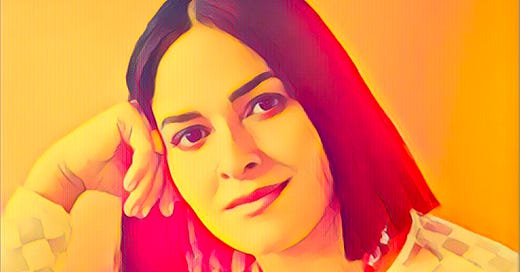

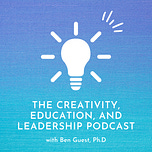


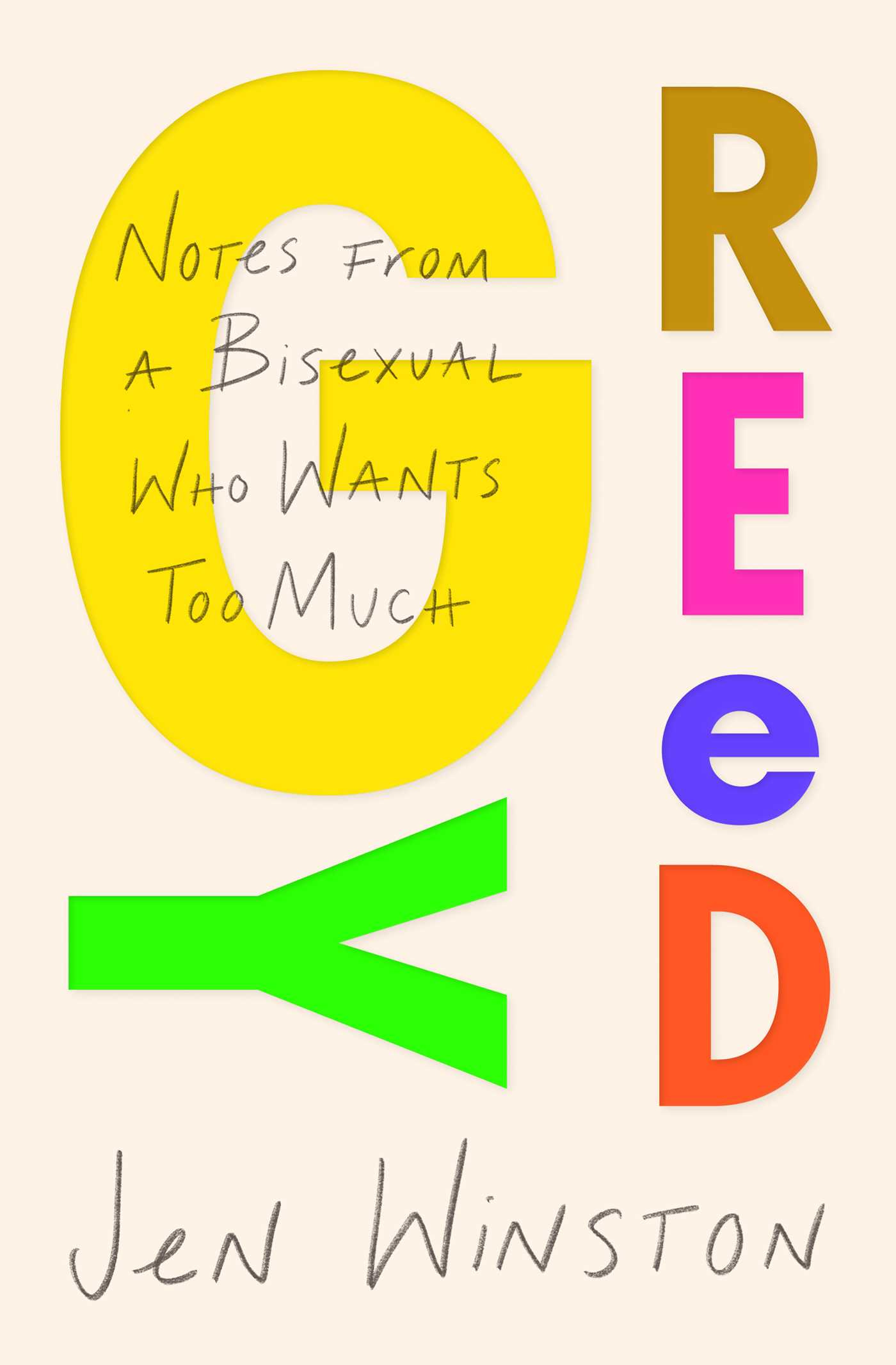

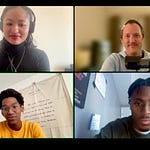


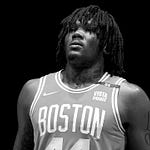
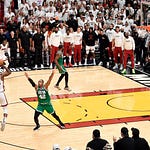
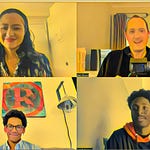
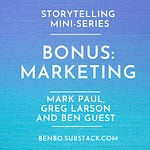
Share this post